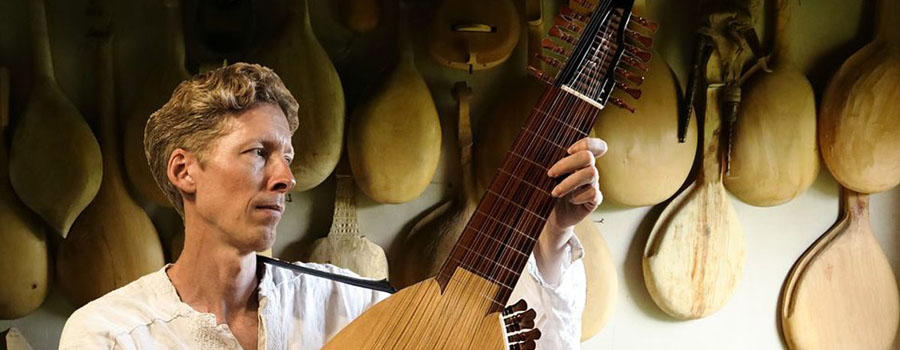
The Kobzar’s Prayer for Ukraine: The Sacred National Instruments of Ukraine
Thursday, June 9, 2022 at 5:30pm
Outdoor Stage at The Church of the Holy Trinity, 381 Main Street, Middletown, Connecticut
FREE!
Ukrainian-American musician Jurij Fedynskyj will make his Connecticut debut in a free outdoor concert, The Kobzar’s Prayer for Ukraine: The Sacred National Instruments of Ukraine, at The Church of the Holy Trinity, located at 381 Main Street in Middletown, Connecticut. Admission is free, and the rain location will be inside the church.Born in Indianapolis and raised in Raleigh, Fedynskyj has lived in the Ukraine for the past 23 years as a Kobzar, a traveling storyteller, and has spent the last few months performing across the worst hit areas of the country and singing for military troops, childrens’ hospitals, and in bomb shelters. Currently on a short tour of the United States, he is sharing these unique instruments, historical traditions, and stories to raise awareness at this crucial moment in history. He helped his pregnant wife and children escape Ukraine when Russia invaded in February. She gave birth while staying with relatives in North Carolina, and will return with her family after this tour. The leader of the Poltava Kobzar Guild, Fedynskyj also runs Kobzarskiy Tabir, an educational center in the small village of Kryachkivka of the Poltava region in Ukraine, which is dedicated to the revival of the Ukrainian Kobzar tradition.
This concert is made possible in part by support from the Wesleyan University Dance Department. Fedynskyj previously worked in New York with Katja Kolcio, Director of the Allbritton Center for the Study of Public Life, and Associate Professor of Dance, Environmental Studies, Russian, East European, and Eurasian Studies, and Education Studies. Kolcio's somatic-activist work has been based on the Ukrainian Revolution of Dignity since 2014, connecting her dance and somatic practices with psycho-social resilience and social justice-based activism.
Earlier this spring, Kolcio hosted “Standing with Ukraine” along with Barry Chernoff, Director of the College of the Environment, Robert Schumann Professor of Environmental Studies, and Professor of Biology, Earth and Environmental Sciences. The series of livestream international conversations allowed members of the Wesleyan community to connect with students, civic leaders, experts, and artists in Ukraine in an effort to humanize the war by hearing their perspectives from the war zone.
Fedynskyj previously performed as part of the Experimental Bandura Trio with Michael Andrec and Julian Kytasty, another frequent collaborator with Kolcio. Kolcio will be working with Fedynskyj on a new project about the Ukraine, along with vocalist Nadia Tarnawska, who she will be bringing to Wesleyan this fall.
Listen to Katja Kolcio on "The History and Evolution of Ukrainian National Identity" on The Conversation Weekly podcast.
Kobzars are bards who sing epic songs called dumy (reflections) laced with news of current events, political commentary, and the quest for peace and freedom; and accompany themselves on multi-stringed banduras (plucked instruments whose tone is often described as a blend of the piano and the harp), torbans or kobzas (lutes). Before newspapers and radio, this is how news from the cities was shared through the villages and countryside. The tradition was nearly exterminated by Joseph Stalin in 1935, when he assembled Kobzars under the pretense of an ethnographic conference, only to execute them.
Donations for Ukraine will be accepted at the concert, with proceeds going to the Ukrainian Kobzars and the Community Self-Help Credit Union, which has sent seven tons of fire department equipment to Ukraine.
Read the feature "War isn't dampening artists' determination to revive Indigenous Ukrainian music" from All Things Considered on NPR.
Read "Ukrainian American tries waging peace in Kyiv through music" from Texas Public Radio.